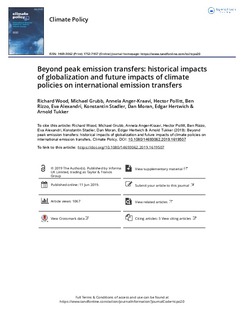Beyond peak emission transfers: historical impacts of globalization and future impacts of climate policies on international emission transfers
Wood, Richard; Grubb, Michael; Anger-Kraavi, Annela; Pollitt, Hector; Rizzo, Ben; Alexandri, Eva; Stadler, Konstantin; Moran, Daniel; Hertwich, Edgar; Tukker, Arnold
Journal article, Peer reviewed
Published version

Åpne
Permanent lenke
http://hdl.handle.net/11250/2629762Utgivelsesdato
2019Metadata
Vis full innførselSamlinger
Sammendrag
Globalization of supply chains has resulted in rapid increases in emission transfers from the developing to the developed world. As outsourcing has risen, developed countries have been able to decarbonize domestically, at the expense of increased emissions in developing countries. However, the rapid improvement of carbon efficiency in developing regions together with the post-2008 deceleration in international trade raises the question of whether such embodied emission transfers have peaked. Here we update historical analysis, finding that emission transfers between OECD and non-OECD countries peaked in 2006, and have been declining since. The reversal is principally due to the reduction in the emissions intensity of traded goods, rather than the volume of trade. A more recent decline in embodied emissions transfers is also observed in trade between developing countries. We analyse whether these trends are likely to continue, by exploring a baseline and a Nationally Determined Contribution (NDC) scenario with the Macro-econometric Energy-Environment-Economy Model (E3ME) model. The results suggest that absolute embodied emissions will plateau at current levels or slowly return to pre-2008- crisis levels, and differences between the NDC and baseline scenarios imply that NDC policies will not result in significant carbon leakage. However, the share of national footprint embodied in imports, at least for countries with ambitious decarbonization policies, will likely increase. This suggests that, despite the world-wide stabilization of emissions transfers, addressing emissions embodied in imports will become increasingly important for reducing carbon footprints.
